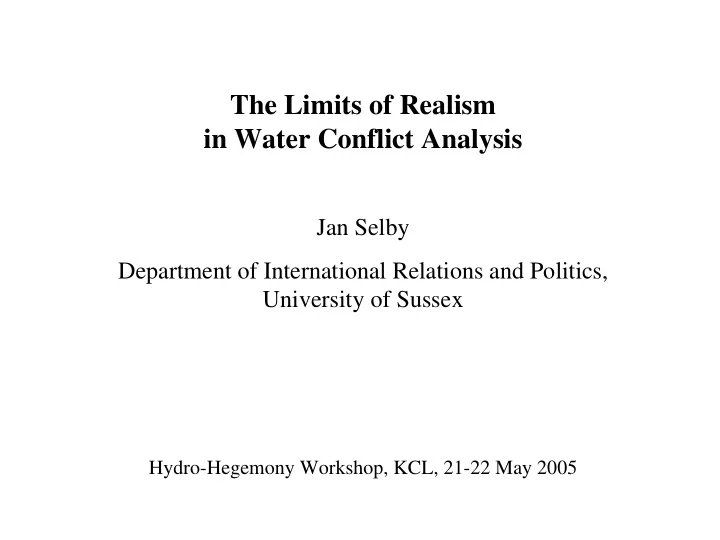

The Limits of Realism in Water Conflict Analysis Jan Selby Department of International Relations and Politics, University of Sussex Hydro-Hegemony Workshop, KCL, 21-22 May 2005
Realist International Theory: Key Principles (1) International-domestic divide: - domestic order, government and sovereignty - international anarchy (2) National-territorial state (3) Power and security: both state means and state end (4) Objective national needs, interests and preferences (5) Absence of progress (except courtesy of power relations)
What’s Wrong with Realism? (1) Idealised domestic-international divide (Rosenberg, Tilly, Kaldor) (2) Unrealistic model of the indivisible ‘national territorial’ rather than ‘institutional’ state (Halliday) (3) Both power and interests need deconstructing and historicising (4) Progress is possible (Cox) (5) Realism and idealism as partners-in-crime
For a Marxist-Foucauldian Approach (1) Society rather than state-centrism - Marxist theory: class structures, relations and conflicts - Foucauldian theory: social knowledge and technologies (2) State (understood as institution) as the superstructural product of social structures and relations (3) State power as condensation of social power relations, and as productive rather than repressive (4) ‘National interests’ as mythical reflection of social structures
What’s All This Got To Do With Water? (1) It is invalid to make universal claims about the water interests of states, or about the determinants of state action vis v vis water, since these always reflect social structures and relations - e.g. Israel and agriculture (2) It is misleading to concentrate solely on the state as possessor of ‘power over’ water resources (a) because power over water is less important than ‘power to produce’ water (both conventional and unconventional supplies) (b) because power over water is socially dispersed - e.g. Khaled Batrakh Reservoir
What’s All This Got To Do With Water (2)? To Hebron and 2 m Kiryat Arba To Kiryat Arba Khaled Batrakh Reservoir
What’s All This Got To Do With Water (3)? (3) It is a serious mistake to focus exclusively or even primarily on the international dimensions of water politics: - internal social conflicts over water are often violent - the contemporary global political economy is one of growing state-state ties plus growing social inequalities and marginalisation (esp. of rural and slum communities) - internal violent social conflicts are likely to get worse
References These claims are developed further esp. in: Water, Power and Politics in the Middle East: The Other Israeli- Palestinian Conflict (IB Tauris, 2003) “Dressing up domination as ‘co-operation’: the case of Israeli- Palestinian water relations,” Review of International Studies , Vol. 29, No. 1 (2003), pp. 121-38 “The geopolitics of water in the Middle East: fantasies and realities,” Third World Quarterly , Vol. 26, No. 2 (2005), pp. 329-49 “Oil and water: the contrasting anatomies of resource conflicts,” Government and Opposition , Vol. 40, No. 2 (2005), pp. 200-224
Recommend
More recommend